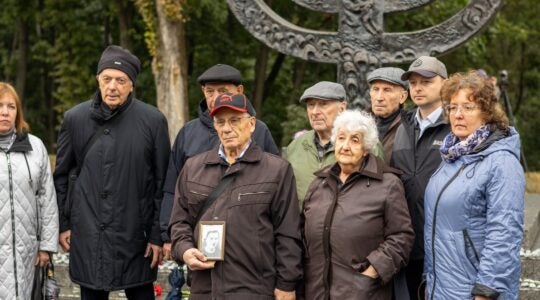BUENOS AIRES, Argentina (JTA) — Argentine Jewish groups were expecting a long-awaited victory on Wednesday in the 26-year struggle for justice in the 1994 AMIA Jewish center terrorist bombing, figuring there was enough evidence to convict the car mechanic accused of preparing the deadly car bomb.
But a federal court acquitted the defendant, Carlos Telleldin, in a second trial in the case. The court said it would not detail its decision until March 26, offering only a one-line decision “to acquit Carlos Alberto Telleldin for the facts that he was accused,” Judge Andres Basso said.
The AMIA and DAIA Jewish umbrella groups said they will appeal the verdict.
According to the indictment, Telleldin filled a Renault van, the engine of which was found in the rubble after the explosion, with explosives. He left it in a parking lot and handed it over to unidentified individuals who carried out the bombing, which killed 85 and injured 300.
“The evidence collected is more than enough to achieve the degree of certainty and to convict the accused on order of the crime of malicious havoc, in the form of an explosion, followed by deaths, also attributable to malicious intent,” an AMIA attorney said during the trial last month. The group had called for a punishment of 20 years in prison.
The decision is the culmination of a protracted struggle to find closure in a case that has outraged the Argentine Jewish community for decades.
Telleldin was arrested just one week after the July 1994 attack along with five Buenos Aires police officers who allegedly were involved in the operation, and spent 10 years in prison. But it was uncovered that Telleldin was paid $400,000 in 1995 for his cooperation in the trial, leading a judge to dismiss the evidence collected in the case. Telleldin earned a law degree in prison and practiced when he was released.
AMIA and DAIA appealed, arguing that the evidence collected before the illegal payment should be considered valid. The Supreme Court agreed in 2009 and ordered a new trial for Telleldín. The trial started only last year, 10 years after that order.
“The Court’s decision shamefully consolidates the path of impunity,” an AMIA spokesperson told the Jewish Telegraphic Agency. “It … adds more pain and generates an inexplicable confusion, taking into account the evidence presented.”
Iran and Hezbollah have long been linked to the attack. Based on the investigations of the late prosecutor Alberto Nisman, who was Jewish, six Iranians and one Lebanese have been on Interpol’s most wanted list since 2007.
Argentina signed a controversial Memorandum of Understanding with Iran in 2013 under then-president Cristina Fernández de Kirchner stating that the two countries would jointly investigate the attack. Critics said it violated the executive branch’s principles of independence.
Nisman, who alleged that Argentina’s president and other government ministers covered up Iran’s role in the bombing, was found dead in his Buenos Aires apartment in January 2015, hours before he was to present his allegations to Congress. His death was ruled a likely suicide, but an Argentine federal appeals court later called it murder.
The Iran-Argentina agreement was voided in December 2015 in the first week of Mauricio Macri’s presidency.
In 2019, on the 25th anniversary of AMIA bombing, Argentina listed Hezbollah as a terrorist group.
JTA has documented Jewish history in real-time for over a century. Keep our journalism strong by joining us in supporting independent, award-winning reporting.






